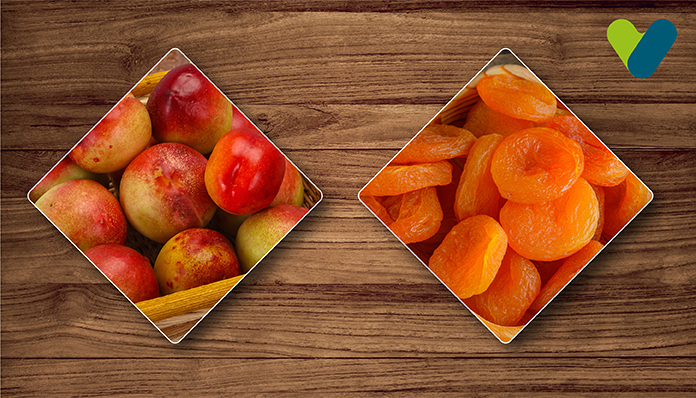These days, people are more cautious about their diet and are incorporating wholesome fruits and vegetables into their diet regime to lead a healthy life. Apricot is one of such fruits that offer umpteen health benefits. Apricots (Armenian plums) are the smaller versions of pitches but have the acerbity of purple plums.
What is apricot?
Apricot is a fruit that is commonly found in all temperate regions, especially in the Mediterranean. You can either eat them fresh or cooked. Apricot fruit is used in making jams and producing the flavor of liqueurs. Apricots are high in natural sugar and they are an ideal source of vitamin A. Dried apricots are loaded with iron.Apricot Nutrition
Let us first acquaint you with the nutritional value of apricot. Two fresh apricots (70 grams) contain:- Calories: 34
- Carbs: 8 g
- Protein: 1 g
- Fat: 0.27 g
- Fiber: 1.5 g
- Vitamin A: 8% of the Daily Value (DV)
- Vitamin C: 8% of the DV
- Vitamin E: 4% of the DV
- Potassium: 4% of the DV
8 Surprising Apricot Health Benefits
Here goes the list of 8 lesser-known health benefits of eating apricots:1. Rich in Antioxidants
Apricots contain many antioxidants, including beta carotene and vitamins A, C, and E. Moreover, apricots are rich in flavonoids (polyphenol antioxidants) that safeguard you against various ailments including diabetes and heart disease. The flavonoids in apricots are chlorogenic acids, catechins, and quercetin.All these components extirpate free radicals that are responsible for oxidative stress. Oxidative stress is related to various chronic diseases.
2. Beneficial For Your Eyes
Apricots contain components like vitamin A and E that improve the health of your eyes.Vitamin A is important in preventing night blindness. On the other hand, fat-soluble vitamin E enters your eyes directly and safeguards them from free radical damage. Apricots also contain carotenoids like lutein and zeaxanthin which protect your eyes against oxidative stress.
3. Improve Your Skin
Eating apricots will protect your skin from various damage factors, such as the sun, pollution, and cigarette smoke.Vitamins C and E in apricots may support your skin. Vitamin C produces collagen that improves the elasticity and strength of your skin. Moreover, vitamin C gives protection against UV damage and environmental pollutants by removing free radicals from your body. Beta carotene in apricots protects your skin against sunburns.
4. Promote a Healthy Gut
One cup (165 grams) of sliced apricots offers 3.3 grams of fiber, which is 8.6% and 13.2% of the DV for men and women, respectively.Apricots are rich in both soluble and insoluble fiber. Apricots are mainly high in soluble fiber which is imperative in maintaining healthy blood sugar and cholesterol levels.
Fibers improve your GI functions and are good for your healthy gut bacteria. A healthier gut microbiome lessens the risk of obesity.
5. Rich in Potassium
Apricots contain potassium which is responsible for sending nerve signals and controlling muscle contractions and fluid balance. Two apricots (70 grams) offer 181 mg of potassium, which is 4% of the DV.Adequate intake of potassium will prevent bloating and maintain healthy blood pressure. A study was performed on 33 participants who followed a potassium-rich diet. At the end of the study, it has revealed that potassium reduced blood pressure and resulted in a 24% lower risk of stroke.


